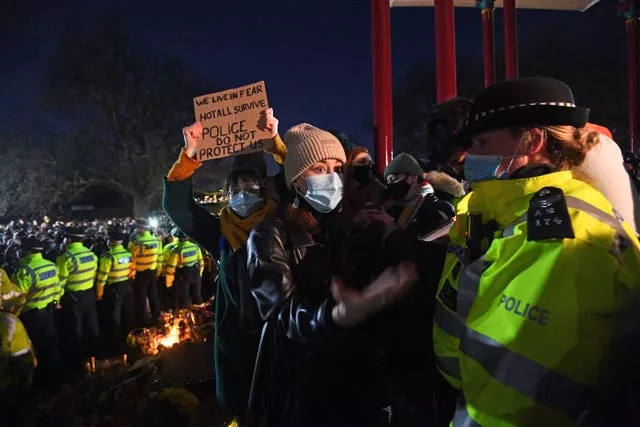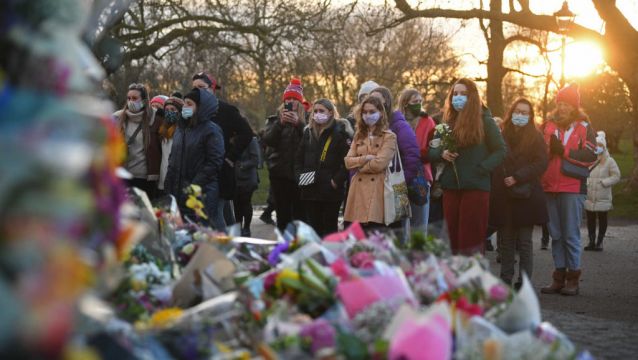The UK Metropolitan Police have been refused permission to appeal for a second time against a High Court ruling which concluded the force breached the rights of organisers of a vigil for Sarah Everard with its handling of the planned event.
Reclaim These Streets (RTS) proposed a socially distanced vigil for the 33-year-old, who was murdered by former Met officer Wayne Couzens, near to where she went missing in Clapham, south London, in March last year.
The four women who founded RTS and planned the vigil brought a legal challenge against the force over its handling of the event, which was also intended to be a protest about violence against women.
They withdrew from organising the vigil after being told by the force they would face fines of £10,000 each and possible prosecution if the event went ahead, and a spontaneous vigil and protest took place instead.
Jessica Leigh, Anna Birley, Henna Shah and Jamie Klingler argued that decisions made by the force in advance of the planned vigil amounted to a breach of their human rights to freedom of speech and assembly, and said the force did not assess the potential risk to public health.
In a ruling in March, their claim was upheld by Lord Justice Warby and Mr Justice Holgate, who found that the Met’s decisions in the run-up to the event were “not in accordance with the law”.
After considering an application on papers – without a hearing – by the Met to challenge the ruling at the Court of Appeal, the judges refused the force permission to bring an appeal in April.

The Met then further pursued a challenge by asking the Court of Appeal to grant permission, but that was rejected in writing on Tuesday.
Dismissing the appeal bid, Lord Justice Holroyde said in a court order that, while he recognised the application of principles guiding the right to protest “may be difficult for the police, and that the difficulty may be increased when considering a prospective event” they were “clear” and no separate guidance is needed.
The judge said he could see “no arguable basis on which it can be said that the (High) Court’s decision was wrong”.
He added: “The court’s evaluation of the evidence involved no error of principle or unsustainable finding… an appeal therefore does not have a real prospect of success, and there is no other substantial reason why an appeal should be heard.
“Permission to appeal must accordingly be refused.”
The decision means the force will not be able to further challenge the High Court ruling.
RTS said on Twitter that they were “thrilled to announce” the court’s decision after receiving the order, while Ms Klingler tweeted: “IT IS FINALLY OVER. Vindication.”

A Met Police spokesperson said in a statement: “We are aware of the Court of Appeal’s decision. We will be considering it carefully and will comment further in due course.”
In a summary of the High Court ruling, Lord Justice Warby said: “The relevant decisions of the (Met) were to make statements at meetings, in letters, and in a press statement, to the effect that the Covid-19 regulations in force at the time meant that holding the vigil would be unlawful.
“Those statements interfered with the claimants’ rights because each had a ‘chilling effect’ and made at least some causal contribution to the decision to cancel the vigil.
“None of the (force’s) decisions was in accordance with the law; the evidence showed that the (force) failed to perform its legal duty to consider whether the claimants might have a reasonable excuse for holding the gathering, or to conduct the fact-specific proportionality assessment required in order to perform that duty.”
RTS took urgent legal action the day before the planned event, seeking a High Court declaration that any ban on outdoor gatherings under the coronavirus regulations at the time was “subject to the right to protest”.
And with the order for those that would like the detail. https://t.co/LCm2DDb7fy pic.twitter.com/JjLy5Eg0TV
— Reclaim These Streets (@ReclaimTS) May 31, 2022
But their request was refused and the court also refused to make a declaration that an alleged force policy of “prohibiting all protests, irrespective of the specific circumstances” was unlawful.
Couzens, 49, was given a whole life sentence, from which he will never be released, at the Old Bailey in September after admitting Ms Everard’s murder.
The policing of the spontaneous vigil that took place drew criticism from across the political spectrum after women were handcuffed on the ground and led away by officers.
A report by Her Majesty’s Inspectorate of Constabulary and Fire and Rescue Services concluded the police “acted appropriately” when dealing with the event, but also found it was a “public relations disaster” and described some statements made by members of the force as “tone deaf”.







